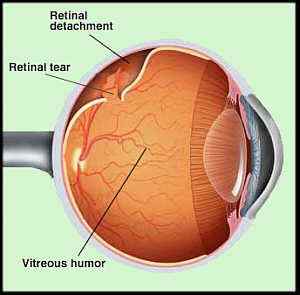

MedFriendly®


Abruption
Abruption means a tearing way, detachment, breaking
away, or separation (often suddenly and sometimes
violently). An example is a placental abruption, which is
a premature detachment of the placenta. The placenta
is an organ in the uterus (a hollow organ in which a
baby develops) that links the blood supply of the mother
to the developing baby and by which the baby can
release wastes. Another example is abruption of the
retina (commonly referred to as retinal detachment).
The retina is an area at the back of the eye that is
sensitive to light. See the picture to the right.
FEATURED BOOK: Muscle Exercises Encyclopedia
Retinal abruption example.
Abruption can also occur to bones. A common example would be abruption of the
shoulder (i.e., shoulder separation). Abruption can also occur to tendons (groups of
fibers that attach muscles to a bone). Abruptions can also occur in areas of skin (e.g., a
skin tear), nails (e.g., breaking away of a toe nail), membranes (a thin layer of flexible
tissue that covers something), and pathological conditions such as blisters, cysts, and
aneurysms. A cyst is an abnormal lump, swelling, or sac that contains fluid, a part solid
material, or a gas, and is covered with a membrane. An aneurysm is a balloon-like
expansion of a blood vessel due to weakening of the blood vessel walls. Abruption
comes from the Latin word "ab" meaning "away from" and the Latin word "rumpere"
meaning "rupture." Put the words together and you have "rupture away from."
"Where Medical Information is Easy to Understand"™
















